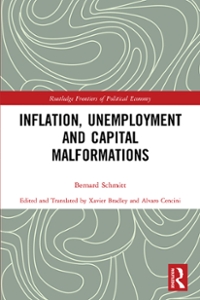Question
Some economic fallacies do not die quickly. Take the belief that the only determinant of a market price is the cost of producing the particular
Some economic fallacies do not die quickly. Take the belief that the only determinant of a market price is the cost of producing the particular good. When a price rises or falls, it is commonly assumed that the item's cost of production must have gone up or down. Moreover, there is a tendency to condemn price increases that are not apparently due to higher production costs.
However, market prices are not mere reflectors of production costs. To see the driving force behind market prices, consider truck rental rates between Houston and Detroit. The Wall Street Journal reported that one year the Detroit-to-Houston charge for a twenty-four-foot U-Haul van was about $1,800 plus gasoline. U-Haul's costs for the reverse trip from Houston to Detroit were no different, yet the fee for the same van northbound was only $300 plus fuel. The truck rental fee varied six-fold, depending simply on which way one was traveling.
That difference seems unjustified to one who clings to the old wives' tale that only production costs determine prices. Competition among consumers for the available supply determines truck rental fees and all other markets. Increased demand would cause the price to be bid up. A smaller available quantity would further intensify consumers' bidding. Conversely, a diminished demand or an increased supply would weaken consumers' competition and cause the price to fall.
Thus, two factors determine a market price: consumers' demand and the available supply. Either or both can change without any change in the cost of production. The early 1980s decline in the auto industry induced more people to migrate from Detroit to other areas, such as Houston. The demand for rental trucks in Detroit jumped. Inventories dropped. Rental rates soared in order to apportion existing truck supplies among competing renters. Therefore, someone who wanted to move from Detroit to Houston had to pay a higher rental fee because increased consumer demand and consequent dwindling inventories made rental trucks scarcer in Detroit. Meanwhile, the truck competition in Houston was much smaller, and the available supply increased as people arrived from depressed areas such as Detroit. Both factorsa smaller demand and a larger supply kept rental rates in Houston much lower.
The lesson is clear. Prices move up or down to ration the existing supply among those who demand it. Furthermore,market-clearing prices can vary for the same good at different times or locationseven though production costs are identical. So, matinees are cheaper than evening performances; early-bird restaurant specials are less expensive; and U-Haul trucks from Detroit to Houston are much higher priced than those from Houston to Detroit.
Production costs influence market prices, but only to the extent that these costs affect the available supply. Supply and demand are the actual moving forces behind market prices.
- What happens to the opportunity cost of renting a truck, an apartment, etc., when more people want it than before? When fewer people want it than before?
- If the costs of producing an item determine its value, should more brilliant students get lower grades if they learn the material more quickly or easily?
Step by Step Solution
There are 3 Steps involved in it
Step: 1

Get Instant Access to Expert-Tailored Solutions
See step-by-step solutions with expert insights and AI powered tools for academic success
Step: 2

Step: 3

Ace Your Homework with AI
Get the answers you need in no time with our AI-driven, step-by-step assistance
Get Started


